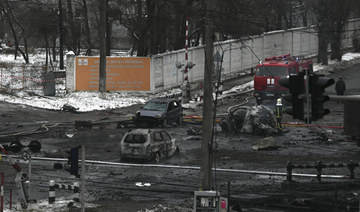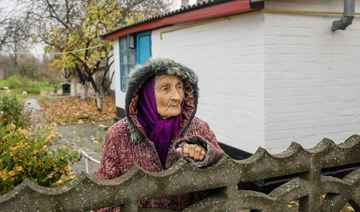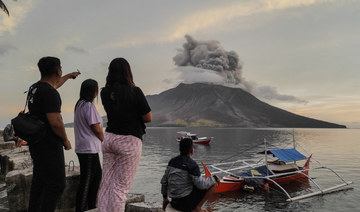KYIV: Ukrainian President Volodymyr Zelensky demanded the United Nations punish Russia for air strikes on civilian infrastructure, after a missile barrage plunged cities into freezing darkness in the worst nationwide power outages yet.
With temperatures falling below zero, authorities were working on Thursday to get the lights and heat back on. Russia’s latest missile barrage killed 10 people and shut down all of Ukraine’s nuclear power plants for the first time in 40 years.
Regional authorities in Kyiv said power had been restored to three quarters of the capital by Thursday morning and water was working again in some areas. Transport was back up and running in the city, with buses replacing electric trams.
Authorities hoped to restart the three nuclear power plants in Ukrainian-held territory by the end of the day.
Since early October, Russia has launched huge barrages of air strikes around once a week at energy targets across Ukraine, each time firing hundreds of millions of dollars worth of missiles to knock out Ukraine’s power grid.
Moscow acknowledges attacking basic infrastructure, saying its aim is to reduce Ukraine’s ability to fight and push it to negotiate. Kyiv says such attacks are clearly intended to harm civilians, making them a war crime.
“Today is just one day, but we have received 70 missiles. That’s the Russian formula of terror. This is all against our energy infrastructure,” Zelensky said overnight via video link to the UN Security Council chamber. “Hospitals, schools, transport, residential districts all suffered.”
Kremlin spokesman Dmitry Peskov said it was Kyiv’s fault Ukrainians were suffering because it refused to yield to Moscow’s demands, which he did not spell out. Ukraine says it will only stop fighting when all Russian forces have left.
“What is there to talk about? I think that the first step should come from them. For starters, they have to stop shelling us,” said 27-year-old Olena Shafinska, queuing at a water pump in a park in central Kyiv with a group of friends.
For the first time, the Russian attacks forced Kyiv to switch off the three nuclear power plants it still controls. The fourth, in Russian-held territory, also had to activate backup diesel power. Nuclear officials say interruptions in power can disrupt cooling systems and cause an atomic disaster.
“There is a real danger of a nuclear and radiation catastrophe being caused by firing on the entire territory of Ukraine with Russian cruise and ballistic missiles,” Petro Kotin, head of Ukraine’s nuclear operator Energoatom said.
“Russia must answer for this shameful crime.”
WEAPONISING WINTER
Winter has arrived abruptly in Ukraine and temperatures were well below freezing in the capital, a city of three million. US Ambassador to the UN Linda Thomas-Greenfield said Russian President Vladimir Putin was “clearly weaponizing winter to inflict immense suffering on the Ukrainian people.”
The Russian president “will try to freeze the country into submission,” she added.
There was no prospect of action from the Security Council, where Russia wields a veto. Moscow’s UN ambassador, Vasily Nebenzya, said it was against council rules for Zelensky to appear via video, and rejected what he called “reckless threats and ultimatums” by Ukraine and its supporters in the West.
He blamed damage to Ukraine’s infrastructure on its air defense missiles and said the West should stop supplying them.
Ukrainian authorities said three apartment blocks were hit on Wednesday, killing ten people.
“Our little one was sleeping. Two years old. She was sleeping, she got covered. She is alive, thanks be to God,” said a man who gave his name as Fyodr, dragging a suitcase as he walked away from a smoldering apartment building hit in Kyiv.
The blackouts also spread to neighboring Moldova, where authorities said most power was back on by Thursday.
Moscow has shifted to the tactic of striking Ukraine’s infrastructure even as Kyiv has inflicted battlefield defeats on Russian forces since September. Russia has also declared the annexation of land it occupies and called up hundreds of thousands of reservists.
The war’s first winter will now test whether Ukraine can press on with its campaign to recapture territory, or whether Russia’s commanders can keep their invasion forces supplied and find a way to halt Kyiv’s momentum.
Having retreated, Russia has a far shorter line to defend to hold on to seized lands, with more than a third of the front now blocked off by the Dnipro River.
“Ukraine will slowly grow in capabilities, but a continued maneuver east of the Dnipro River and into Russian-occupied Donbas will prove to be much tougher fights,” tweeted Mark Hertling, a former commander of US ground forces in Europe.
“Ukrainian morale will be tested with continued Russian attacks against civilian infrastructure ... but Ukraine will persevere.”
Russia has been pressing an offensive of its own along the front line west of the city of Donetsk, held by Moscow’s proxies since 2014. Ukraine says it has killed thousands of Russian troops there and yielded little ground, describing the Russians as hurled into battle with little equipment or training.
Ukraine’s general staff said Russian forces tried again to advance on their main targets in Donetsk region — Bakhmut and Avdiivka with only limited success.
Further south, Russian forces were digging in on the eastern bank of the Dnipro, shelling areas across it including the city of Kherson, recaptured by Ukrainian forces this month.
Reuters could not immediately verify the battlefield accounts.
Moscow says it is carrying out a “special military operation” to protect Russian speakers in what Putin calls an artificial state carved from Russia. Ukraine and the West call the invasion an unprovoked war of aggression.
Ukrainians suffer in cold, darkness as president implores UN to punish Russia
https://arab.news/p5mza
Ukrainians suffer in cold, darkness as president implores UN to punish Russia
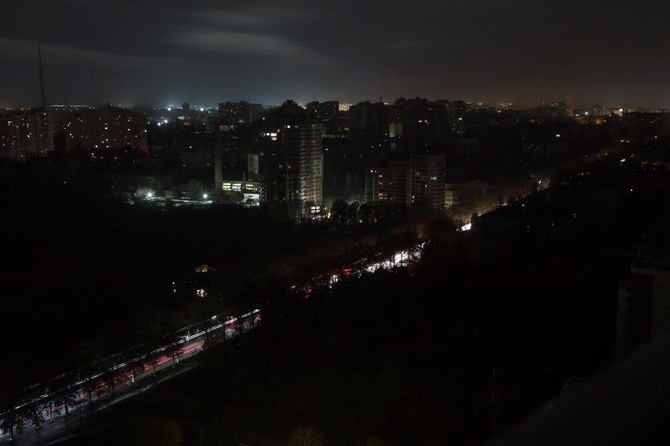
- With temperatures falling below zero, authorities were working on Thursday to get the lights and heat back on
- Regional authorities in Kyiv said power had been restored to three quarters of the capital by Thursday morning and water was working again in some areas
India opposition social media chief arrested over doctored video

- Congress party’s Arun Reddy was detained in connection with the edited footage, showing Interior minister Amit Shah
- Shah is often referred to as the second-most powerful man in India after Hindu-nationalist Prime Minister Narendra Modi
NEW DELHI: Indian police said Saturday they had arrested the social media chief of the country’s main opposition party over accusations he doctored a widely shared video during an ongoing national election.
The Congress party’s Arun Reddy was detained late Friday in connection with the edited footage, which falsely shows India’s powerful interior minister Amit Shah vowing in a campaign speech to end affirmative action policies for millions of poor and low-caste Indians.
Shah is often referred to as the second-most powerful man in India after Hindu-nationalist Prime Minister Narendra Modi, and the pair have been close political allies for decades.
Reddy “was arrested yesterday on investigation about... a doctored video of the home minister,” deputy commissioner of Delhi police Hemant Tiwari told AFP.
“We produced him in the court and he is in police custody.”
Congress spokesperson Shama Mohamed confirmed Reddy’s arrest to AFP but denied he was responsible for creating or publishing the clip.
“He is not involved in any doctored video. We are supporting him,” she said.
Authorities seized Reddy’s electronic devices for forensic verification, the Indian Express newspaper reported Saturday, quoting an unnamed police officer who accused Reddy of having “cropped and edited” the video.
Shah has been campaigning on behalf of Modi’s ruling Bharatiya Janata Party (BJP), which is widely expected to win a third term when India’s six-week election concludes next month.
Analysts have long expected Modi to triumph against a fractious alliance of Congress and more than two dozen parties that have yet to name a candidate for prime minister.
His prospects have been further bolstered by several criminal investigations into his opponents and a tax investigation this year that froze Congress’s bank accounts.
Opposition figures and human rights organizations have accused Modi’s government of orchestrating the probes to weaken rivals.
Modi’s government remains widely popular a decade after coming to power, in large part due to its positioning of the nation’s majority Hindu faith at the center of its politics despite India’s officially secular constitution.
That in turn has left India’s 220 million-strong Muslim community feeling threatened by the rise of Hindu nationalist fervor.
Since voting began last month, both Modi and Shah have stepped up campaign rhetoric on India’s principal religious divide in an effort to rally voters.
In the original campaign speech at the center of the police investigation against Reddy, Shah vows to end affirmative action measures for Muslims established in the southern state of Telangana.
Modi last month used a campaign rally to refer to Muslims as “infiltrators” and “those who have more children,” prompting condemnation and an official complaint to election authorities by Congress.
But the prime minister has not been sanctioned for his remarks despite election rules prohibiting campaigning on “communal feelings” such as religion, prompting frustration from the opposition camp.
“Where is the election commission when the Prime Minister is spewing hate every day?” Shama said.
India’s foreign minister rejects Biden’s ‘xenophobia’ comment

NEW DELHI: Indian foreign minister Subrahmanyam Jaishankar rejected US President Joe Biden’s comment that “xenophobia” was hobbling the South Asian nation’s economic growth, The Economic Times reported on Saturday.
Jaishankar said at a round table hosted by the newspaper on Friday that India’s economy “is not faltering” and that it has historically been a society that is very open.
“That’s why we have the CAA (Citizenship Amendment Act), which is to open up doors for people who are in trouble ... I think we should be open to people who have the need to come to India, who have a claim to come to India,” Jaishankar said, referring to a recent law that allows immigrants who have fled persecution from neighboring countries to become citizens.
Earlier this week, Biden had said “xenophobia” in China, Japan and India was holding back growth in the respective economies as he argued migration has been good for the US economy.
“One of the reasons why our economy’s growing is because of you and many others. Why? Because we welcome immigrants,” Biden said at a fundraising event for his 2024 re-election campaign and marking the start of Asian American, Native Hawaiian and Pacific Islander Heritage Month.
The International Monetary Fund (IMF) forecast last month that growth in Asia’s three largest economies would slow in 2024 from the previous year.
The IMF also forecast that the US economy would grow 2.7 percent, slightly brisker than its 2.5 percent rate last year. Many economists attribute the upbeat forecasts partly to migrants expanding the country’s labor force.
Canada arrests three Indians over killing of Sikh activist
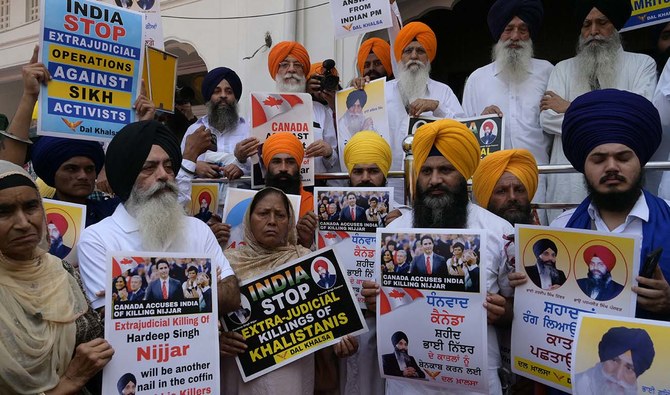
- The murder of Hardeep Singh Nijjar plunged Canada, India into a serious diplomatic crisis last fall
- Nijjar, who immigrated to Canada in 1997, advocated for a separate Sikh state, known as Khalistan
VANCOUVER: Canadian police on Friday arrested three men over the killing last year in Vancouver of a Sikh separatist, whose death has been linked to the Indian government.
The murder of Hardeep Singh Nijjar plunged Canada and India into a serious diplomatic crisis last fall after Prime Minister Justin Trudeau suggested Indian government involvement in the homicide.
India dismissed the allegations as “absurd” and responded furiously, briefly curbing visas for Canadians and forcing Ottawa to withdraw diplomats.
Three Indian nationals, two aged 22 and one aged 28, were arrested Friday and charged with first degree murder and conspiracy charges. They are accused of being the shooter, driver and lookout on the day Nijjar was killed.
They were arrested by police in Edmonton, in the neighboring province of Alberta, where they reside, and are being held pending further proceedings.
All had been in Canada for between three and five years, police said at a news conference.
“This investigation does not end here. We are aware that others may have played a role in this homicide,” said Mandeep Mooker of the Royal Canadian Mounted Police’s homicide investigations team.
Nijjar — who immigrated to Canada in 1997 and became a citizen in 2015 — advocated for a separate Sikh state, known as Khalistan, carved out of India.
He was wanted by Indian authorities for alleged terrorism and conspiracy to commit murder.
On June 18, 2023, he was shot dead by masked assailants in the parking lot of the Sikh temple he led in suburban Vancouver.
Trudeau announced several months later that Canada had “credible allegations” linking Indian intelligence to the killing and expelled an Indian official, spurring the diplomatic tit-for-tat with New Delhi.
Mooker said Canadian police are still investigating the ties of the suspects, “if any, to the Indian government.”
“It is a bit of a sigh of relief that the investigation is moving forward,” Moninder Singh, a close friend of Nijjar, told AFP.
“It is ultimately India who is responsible and hiring individuals to assassinate Sikh leaders in foreign countries,” said Singh, spokesperson for the British Columbia Council of Gurdwaras.
In November, the US Justice Department charged an Indian citizen living in the Czech Republic with allegedly plotting a similar assassination attempt on American soil.
Prosecutors said in unsealed court documents that an Indian government official was also involved in the planning.
The shock allegations came after US President Joe Biden hosted Indian Prime Minister Narendra Modi for a rare state visit, as Washington seeks closer ties with India against China’s growing influence.
US intelligence agencies have assessed that the plot on American soil was approved by India’s top spy official at the time, Samant Goel, The Washington Post reported this week.
Canada is home to some 770,000 Sikhs, who make up about two percent of the country’s population, with a vocal minority calling for an independent state of Khalistan.
Philippine bishops instruct flock to pray for rain, heat relief
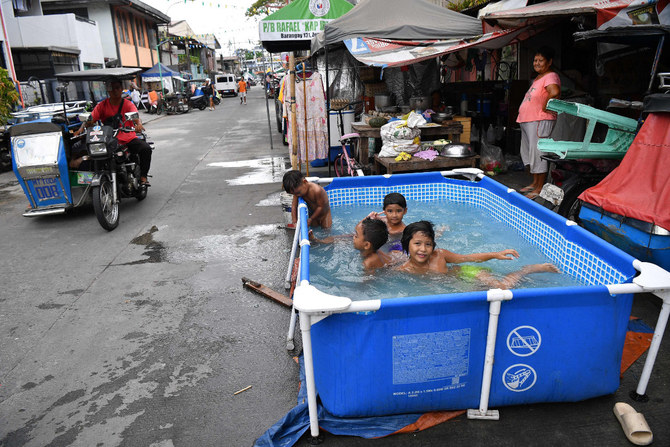
- Rising temperatures have forced the government to shut down tens of thousands of schools over the past week
- Increased demand has also stressed the country’s already strained power supply
MANILA: Catholic bishops in the Philippines are pitching in to seek divine relief from the extreme heatwave scorching the country, instructing their flock to recite special prayers for rain and lower temperatures.
Rising temperatures have forced the government to shut down tens of thousands of schools over the past week, while increased demand has stressed the country’s already strained power supply.
A widespread El Nino drought that began early this year is compounding the problem, ruining 5.9 billion pesos ($103 million) worth of farm produce so far according to the Department of Agriculture.
The Catholic Bishops Conference of the Philippines issued an “Oratio Imperata,” instructing parishes in the mainly Catholic nation to recite a prayer for deliverance from calamities during masses, according to the text seen by AFP on Saturday.
“We humbly ask you to grant us relief from the extreme heat that besets your people at this time, disrupting their activities and threatening their lives and livelihood,” the prayer read.
“Send us rain to replenish our depleting water sources, to irrigate our fields, to stave off water and power shortages and to provide water for our daily needs.”
A record-high 38.8 degrees Celsius (101.8 degrees Fahrenheit) was recorded in the capital Manila on April 27, forcing the closure of more than 47,000 schools for two days.
Nearly 8,000 schools remained shuttered as of Friday, the education department said, while the highest temperature in the country was recorded at 38.2C on the island of Mindoro south of the capital.
Indonesia to permanently relocate 10,000 people after Ruang volcano eruptions
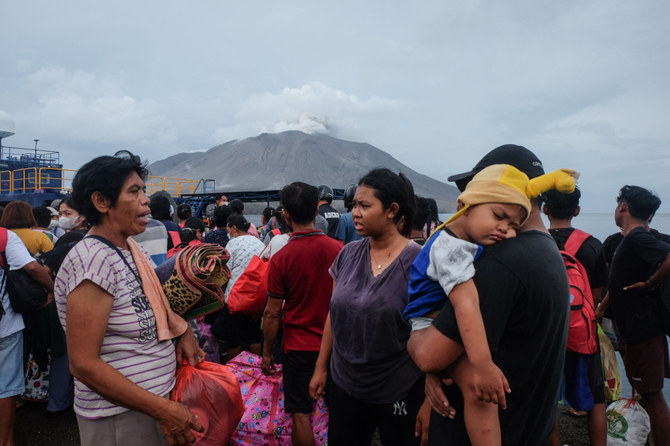
- Authorities warned of the a possible tsunami if parts of the mountain collapse into the surrounding waters
- Indonesia straddles the “Pacific Ring of Fire,” an area of high seismic activity where multiple tectonic plates meet
JAKARTA: The Indonesian government will permanently relocate almost 10,000 residents after a series of explosive eruptions of the Ruang volcano has raised concerns about the dangers of residing on the island in future, a minister said on Friday.
About 9,800 people live on Ruang island, in the province of North Sulawesi, but in recent weeks all residents have been forced to evacuate after the mountain has continued to spew incandescent lava and columns of ash kilometers into the sky.
Authorities this week raised the alert status of the volcano to the highest level, closed the provincial airport in Manado, and also warned of the a possible tsunami if parts of the mountain collapse into the surrounding waters.
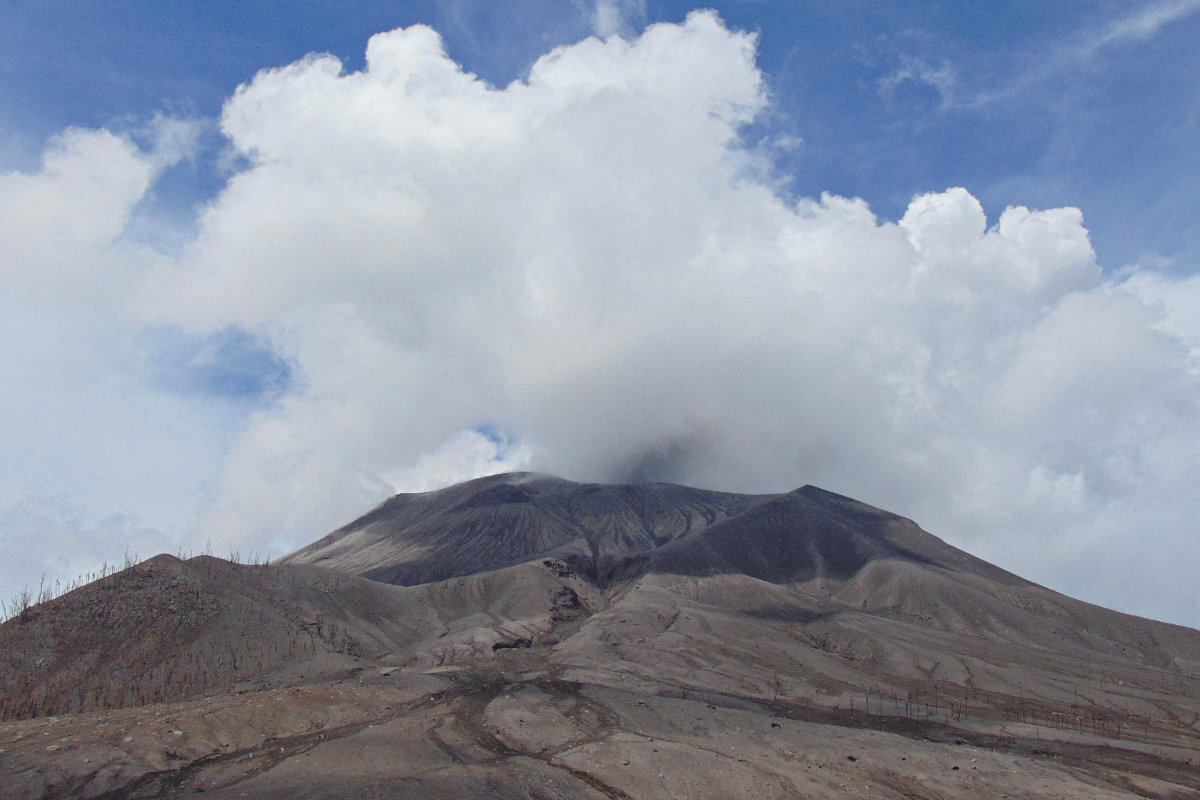
Hundreds of “simple but permanent” homes would be built in the Bolaang Mongondow area to facilitate the relocations, said coordinating human development minister Muhadjir Effendy, after a cabinet meeting to discuss the volcano on Friday.
“As instructed by President Joko Widodo, we will build houses that meet disaster-standards,” he said, adding that the site was located about 200 km (125 miles) from Ruang island.
Mount Ruang began to dramatically erupt last month, with experts saying the eruptions were triggered by increased seismic activity, including deep sea earthquakes.
The mountain erupted again on Tuesday, causing damage to some homes and forcing residents to evacuate from the Tagulandang island, where they had initially sought refuge, to the provincial capital of Manado.
Roads and buildings on Tagulandang were blanketed in a thick layer of volcanic ash, and the roofs of some homes had collapsed, according a Reuters witness.
The volcano had not erupted on Friday but Manado’s Sam Ratulangi Airport remained closed until the evening due to the spread of volcanic ash.
Indonesia straddles the so-called “Pacific Ring of Fire,” an area of high seismic activity where multiple tectonic plates meet.



